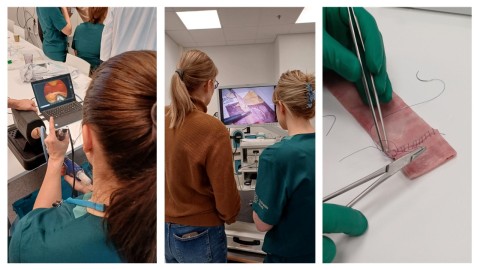The development of expertise involves multi-professional teaching techniques that take ethical and ecological perspectives into account. Clinical skills are practised using various simulators, small-scale training models, appropriate medical devices and biomaterials. From time to time we also create new training models ourselves. Training is planned and implemented in a multidisciplinary manner, making use of medical, health sciences, and pedagogical expertise. Training and skills are assessed systematically and training activities are developed using a research-based approach.
The Center of Healthcare Expertise's activities are guided by a multidisciplinary steering group consisting of representatives from social welfare and health care services, rescue services, the University of Jyväskylä, and JAMK University of Applied Sciences. Furthermore, the activities are supported by a instructors’ advisory board from the Wellbeing Services County of Central Finland. The Center has teaching and training facilities (E3 Kuusi, Kataja and Koivu) at Hospital Nova, where some of the training equipment and devices are located. You can access the premises with a staff pass. Plenty of skill and simulation training sessions also take place in other units' own premises. Medical specialist, specialising physician, physicians undergoing specialist training in general medicine, graduates with a bachelor’s degree in medicine, multidisciplinary teams in emergency departments, nursing staff, health centre physicians, and students are all groups who regularly benefit from the training the Center offers. The scope and methods for implementation of the training vary. In workshop-type training, manual clinical skills focusing on individual procedures for which various training models have been acquired are practised. The broader training programmes include both theoretical instruction and practical training, either using a simulator or real-life patient work. These programmes support the qualification requirements for professional education, for instance in training for specialising physicians.
The simulators and devices used at the Center of Healthcare Expertise allow participants to practise procedures such as:
- gastrointestinal and colon endoscopy procedures
- upper and lower intestinal endoscopies and bronchoscopy procedures
- ophthalmic surgery procedures
- diagnostic and procedure skills focusing on ultrasound technology and identifying and excluding pathological findings for target organs
- gynaecological procedures such as a hysterectomy through the vagina and through the abdominal wall
- multi-professional resuscitation and first aid for persons of different ages
- abdominal cavity closure technique after opening for a procedure and manual knot tying techniques
- procedures requiring access through the abdominal wall, such as gallbladder and appendix removal and hysterectomy
- multi-professional care of emergency and trauma patients
- multi-professional treatment in emergency caesarean sections and difficulties during childbirth (shoulder dystocia, massive haemorrhage)
- multidisciplinary resuscitation of newborns and children
- controlling intra-abdominal massive haemorrhages.
Training programmes at the Center include:
- ‘Lupa leikata’ (Permission to operate) – a course on laparoscopic gallstone surgery for physicians specialising in surgery
for physicians specialising in surgery - induction for physicians specialising in anaesthesiology for bronchoscopy; pulmonary diseases; ear, nose and throat diseases; and surgery
- echocardiography training for physicians working in acute medicine, anaesthesiology, internal medicine and emergency medicine
- training on brain ultrasounds for paediatric diseases
- ‘Lupa leikata’ (Permission to operate) laparoscopic adnexal procedure training programme for physicians specialising in gynaecology and obstetrics
- emergency medical care and transportation course (five days) for physicians involved in or intending to be involved in patient transportation.
Multidisciplinary team training promotes not only medical expertise but also interaction skills, clinical decision-making, cooperation and management skills, and teamwork skills. Team training often involves working with a simulation dummy or a standardised patient. We have a number of patient simulators available, from newborn to adult patient size. All members of the treatment team participate in the team training at the same time and the training is carried out in an authentic treatment environment. Some multidisciplinary teamwork training sessions are implemented in so far as resources allow in cooperation between different units, such as simulation training on the treatment of a high-energy disabled patient from the emergency department to the operating theatre.




